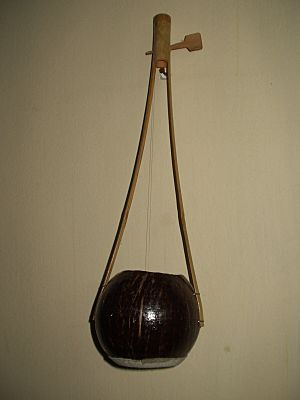Ektara facts for kids
The Ektara (say "ek-TAH-rah") is a special musical instrument that usually has just one string. Its name actually means "one-string" in some languages! You'll often hear the ektara played in traditional folk music from countries like India, Bangladesh, Egypt, and Pakistan.
For a long time, the ektara has been a favorite instrument for traveling musicians and storytellers in India. They would play it by plucking the string with one finger.
Contents
How the Ektara Makes Music
The ektara usually has one string stretched tight. This string goes over a round part, which is often made from a dried pumpkin, a gourd, wood, or even a coconut shell. This round part is covered with animal skin.
Parts of the Ektara
The neck of the ektara is usually a long pole or a piece of bamboo that has been split. The string runs along this neck.
Changing the Sound
To change the sound, musicians press the two halves of the neck together. This makes the string looser and lowers its sound, or "pitch."
Musicians can change the sound in many ways by pressing harder or softer. There are no marks on the instrument to show where to press for different notes. So, players listen carefully and adjust the pressure by ear.
Types of Ektara
Ektaras come in different sizes, just like voices! There are soprano (high-pitched), tenor (medium-pitched), and bass (low-pitched) ektaras.
The bass ektara sometimes has two strings instead of one. When it has two strings, it is often called a dotara.
Images for kids
-
A Toonba and Alghoza instrument from Punjab.
-
A sculpture from the 16th-18th century showing Sage Agastya with a one-stringed instrument, similar to an ektara.
-
An image from the 5th century C.E. Ajanta Caves in India, showing a musician playing a one-stringed alapini vina.
See also
 In Spanish: Ek tara para niños
In Spanish: Ek tara para niños
 | Tommie Smith |
 | Simone Manuel |
 | Shani Davis |
 | Simone Biles |
 | Alice Coachman |







